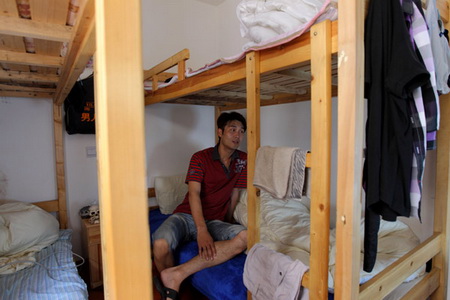Economy
Hostels provide refuge for city job seekers
Updated: 2011-07-05 13:13
By Yu Ran (China Daily)
|
 Mi, who comes from Tianjin, watches TV in this four-bed room. He has stayed in the hostel, for 20 yuan a day, since he arrived in Shanghai three months ago. Neither man provided his given name.[Photo /China Daily] |
A different type of competition has emerged - from lower-cost job hostels opened without certification in standard residential apartments. Xiao Ning, 25, lived in one for a few months to save money.
"It was a three-bedroom apartment with two bathrooms, a tiny kitchen and a living room that was shared by almost 30 male migrant workers," Xiao said. He spent his first two months in Shanghai sleeping in a six-bunk bedroom in the 200-square-meter apartment for 10 yuan a day.
A graduate of Hubei University of Economics, Xiao arrived in Shanghai in April 2010 looking for internships and found a job in the third month. He is a buyer for a local chain supermarket.
"It was too hard and too expensive to find a job in Shanghai, especially for those students like me who did not graduate from a branded university. It left me no choice but to squeeze myself into an extremely crowded place in the beginning."
Xiao said many apartments in the neighborhood were being used as job hostels. Most had white walls, concrete floors and the cheapest wooden beds.
It took him three months after being hired to find the right place, and he now lives alone in a more appealing one-bedroom apartment. He just paid off the money he had borrowed from friends over Spring Festival because he hadn't wanted to ask for more money from his parents, who live in the countryside of Anhui province.
New generation
Traditional migrant workers have experience working in fields. The new ones were brought up in cities by their migrant worker parents, and they either stayed there or moved to other cities to work right after graduating from college.
This new generation of migrant workers accounts for 61.6 percent of China's migrant population, according to the National Bureau of Statistics. Shanghai's 23 million residents include 9 million new generation migrants, 39 percent of the population.
A report released by All-China Federation of Trade Unions defined the new generation as those born in 1980 or later, who are 16 or older and who work in cities but still have a rural hukou (household registration).
Zhou Chenjing, 28, is typical of the new, white-collar migrant workers in Shanghai. She sees herself as a strong woman who has suffered enough to receive better social benefits in the city.
Like most migrant workers, Zhou came to Shanghai five years ago with nothing. She squeezed into a mixed-gender underground job hostel for a month, shared an apartment with a stranger and her boyfriend for nearly a year and now lives with a friend in a two-bedroom apartment.
"I changed jobs four times before obtaining the current one," said Zhou, who is a quality inspector at a toy factory in Shanghai. "I was not satisfied with the salaries and social benefits. I believed that I deserved more than what my former employers offered."
According to market data, the average monthly pay for basic service jobs in Shanghai is about 1,300 yuan, barely enough for a migrant worker to feed herself.
Zhou's first job was as an intern at a trading company. She worked three months, getting paid 1,500 yuan a month, and left in the fourth when the boss refused to raise her salary to 3,000 yuan, as agreed.
"I didn't expect to make more than 5,000 yuan a month but I preferred to have a more kindly employer who would take care of staff members by offering social insurance and reasonable subsidies," Zhou said. Her current net income is 4,500 yuan.

Specials

90th anniversary of the CPC
The Party has been leading the country and people to prosperity.

My China story
Foreign readers are invited to share your China stories.

Green makeover
Cleanup of Xi'an wasteland pays off for ancient city